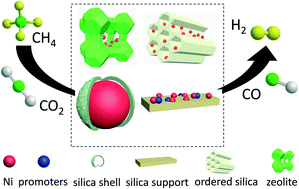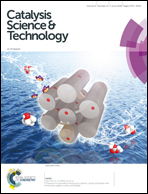Silica-based micro- and mesoporous catalysts for dry reforming of methane†
Abstract
The increasing environmental concern on global warming has triggered intensive research on sustainable utilization of greenhouse gases. CO2 (dry) reforming of methane (DRM) is one of the most effective means since it can transform two major greenhouse gases, CO2 and CH4, together into the more valuable synthesis gas. Silica-based micro- and mesoporous materials turned out to be one promising class of catalysts due to their wide availability, high thermal stability and high specific surface area. In this article, we have overviewed the background and key problems lying in DRM as well as the strength and weakness of silica-based materials used for DRM. Recent developments on these silica-based micro- and mesoporous catalysts including Ni-based catalysts, bimetallic catalysts, perovskite catalysts, Ni-based catalysts doped with promoters and core–shell catalysts for DRM have then been presented by summarizing the synthesis methods and reasons leading to the high catalytic performance and carbon resistance. Finally, key challenges and possible strategies to improve these silica-based catalysts for DRM have been discussed.



 Please wait while we load your content...
Please wait while we load your content...